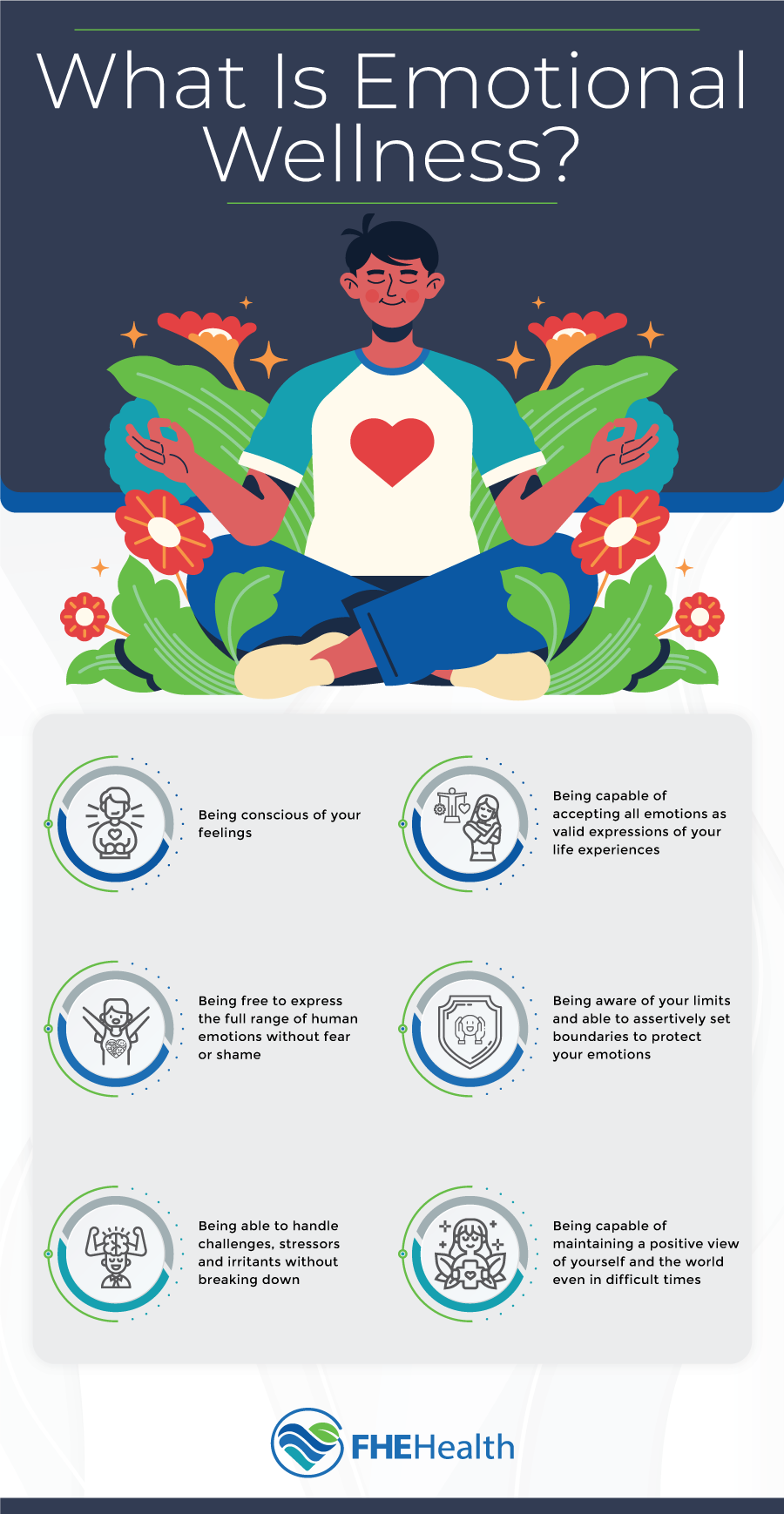
We live in a world that emphasizes logic over emotion. As a result, you may view emotions as a sign of weakness and ignore signs that your emotional well-being is compromised. However, emotions exist and affect different areas of your life, whether you acknowledge them or not.
The American Psychological Association defines emotions or feelings as the brain’s conscious reaction to your environment. They can be aroused by anything, from eating a good meal to not getting enough sleep to watching a cute animal eat. Emotions affect your body and behavior, so it’s important to keep in mind emotional wellness tips to achieve emotional wellness.
But what exactly is emotional wellness, and what role does it play in your daily life? Below are some emotional wellness tips that can help improve your emotional health and well-being.
Treatment can begin quickly and discreetly, get started now Your brain is active every second you’re alive. As a result, your emotions can change even if you don’t know why, because your brain constantly notices and reacts to things in your environment. If you have poor emotional wellness and health, changes in your emotions can negatively impact your thoughts and actions. Emotional wellness refers to your ability to adapt to changes without letting them affect how you care for yourself and interact with others. Your emotional health determines whether you’ll still go to work after spilling coffee on your clothes or return home and spend the day under the covers. Keeping in mind emotional wellness tips can help ensure good emotional health to help you take on challenges in stride and find ways to stay present and happy. Being emotionally healthy doesn’t mean you ignore problems just to remain happy. Instead, when you achieve emotional wellness, you become: Ready to start? More questions about treatment? Being in touch with your feelings and processing emotions healthily sounds like relentlessly hard work. However, emotional health impacts all spheres of your life, so you can’t afford to put up a capable front even as you lose it on the inside. One of the first victims of poor emotional health is your health. Ignoring or suppressing feelings such as stress, sadness or anxiety wreaks havoc on your hormones, leading to serious health problems. People experiencing hormonal imbalances from negative feelings often erupt in hives, experience heartburn and develop ulcers. You may also lose your appetite and have difficulty falling or staying asleep when experiencing emotional turmoil. Studies on health risks show that anger can cause or intensify symptoms of coronary heart disease and bulimia nervosa. The emotions accompanying anxiety disorders affect your heart rate and blood pressure and may lead to diabetes. Sadness or depression can cause fatigue, headaches and stomach issues. These emotions can also cause aggressive or reckless behavior that leads to substance abuse, car accidents, self-harm or suicide attempts. We offer 100% confidential and individualized treatment Noticing the symptoms of declining emotional health lets you take steps to improve it before it impacts your health, relationships and livelihood. Here are a few signs that indicate the need to undertake emotional well-being activities: It’s normal for your emotional health to decline at different points in life. Instead of beating yourself up when you experience emotional decline, use these emotional wellness tips to improve emotional wellness and regain your equilibrium: Since your environment impacts your emotions, you can’t achieve emotional health in a vacuum. Leaning on your romantic partner, friends and family can relieve your emotional burden. Your loved ones can clean, cook and cuddle you, giving you the strength necessary to endure a difficult time. You should also seek professional help from therapists and counselors when experiencing poor emotional health. Mental health professionals have emotional wellness tips to help you achieve emotional wellness. Sometimes, your emotional problems stem from mental health conditions such as depression, bipolar disorder or PTSD. A professional can diagnose the condition and provide treatment that helps you regain emotional balance. FHE Health provides emotional wellness tips and a supportive environment for anyone who needs to achieve emotional health. Our compassionate care team can help you gain healthy coping skills against life’s stressors and maintain good emotional health. We also provide supportive emotional well-being activities, including acupuncture, breathwork, yoga, massage and art therapy. Contact FHE today to work towards achieving emotional wellness. Treatment can begin quickly and discretely, get started now Chris Foy is a content manager and webmaster for FHE Health with years of experience in the addiction treatment industry...read moreNeed Help?
What Constitutes Emotional Wellness? Understanding the Components of a Healthy Emotional State
Begin your recovery today
Why is Emotional Well-Being Important? Exploring Its Impact on Overall Health
More Questions about Treatment?
How Can You Recognize Signs of Emotional Imbalance? Identifying When Emotional Wellness is Compromised
How Can You Nurture Emotional Wellness? Practical Tips for Enhancing Emotional Health
What Does a Holistic Approach Entail? Integrating Self-Care, Support Systems, and Professional Help
Start Treatment Now
![]()
About Chris Foy
Footer







